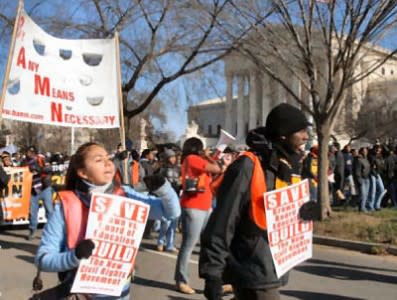Another big affirmative action decision due from the Supreme Court
The Supreme Court heard two high-profile cases last September on election financing and affirmative action. Today, we look at Schuette v. Coalition to Defend Affirmative Action, a significant decision that could be announced soon.
The Schuette case is about a challenge to Proposal 2, an amendment to the Michigan Constitution that voters approved in 2006 banning affirmative action in the state. The question in Schuette is whether the state of Michigan violated the 14th Amendment’s Equal Protection Clause when it amended its state constitution to ban affirmative action programs in its universities and in the public sector.
Specifically, Proposal 2, also known as the Michigan Civil Rights Initiative, prohibited the use of racial, ethnic, or sex-based preferential treatment in admissions considerations for public educational institutions, government contracting, and public employment, thereby effectively prohibiting affirmative action programs in any of Michigan’s public institutions.
Voters in at least six other states have passed similar initiatives to Proposal 2 prohibiting affirmative action in their own states. Indeed, the Michigan initiative copies nearly verbatim California’s Proposition 209, which the state’s voters adopted in 1996 to eliminate preferential admissions and hiring practices in California.
Related Story: Supreme Court may be poised to rule on campaign financing’s future
The Schuette case offers the Court the opportunity to examine affirmative action in a very different way than it had in the Fisher case decided last June and in the Court’s best-known affirmative action decisions—including its seminal 1978 decision in Regents of the University of California v. Bakke (which first approved the use of affirmative action to achieve diversity in higher education) and its 2003 case Grutter v. Bollinger (which upheld the University of Michigan Law School’s affirmative action policies).
Last term, Justice Anthony Kennedy’s decision in Fisher sent the case back to the Fifth Circuit Court of Appeals, which the Supreme Court held had not properly applied the strict scrutiny standard of review to the University of Texas’s affirmative action program.
The Coalition to Defend Affirmative Action, a group supportive of the continued use of affirmative action programs in Michigan, contends that Proposal 2 violates the Equal Protection Clause of the United States Constitution. The Coalition maintains that Proposal 2 marks a major setback for civil rights in the United States by discriminating against minorities and inhibiting them from achieving equality in society, particularly within the context of higher education.
However, Michigan’s Attorney General, Bill Schuette, maintains that Proposition 2 does not run afoul of the Equal Protection Clause and that the voters within a state maintain the right to approve an initiative eliminating affirmative action within the state.
Schuette and other affirmative action opponents maintain that the 14th Amendment’s Equal Protection Clause bars the government from giving preferential treatment to any individuals—whether white or a minority—on the basis of race.
In an 8-7 decision, the Sixth Circuit Court of Appeals sitting en banc held that Proposal 2 denies members of minority races equal protection of the laws. The Sixth Circuit held that the initiative amounted to an unconstitutional restructure of the political process, reasoning that because Proposal 2 amended the Michigan constitution to eliminate the state’s racial preference programs, a separate constitutional amendment would be required to reinstate them, thereby amounting to an unfair burden on minorities.
In an interesting parallel to last term’s Fisher case, Justice Elena Kagan is recused in Schuette, having worked on the case in her former role as Solicitor. Justice Kagan’s recusal leaves open the possibility that the Court will divide 4-4 and thereby leave untouched the Sixth Circuit’s ruling finding the Michigan ban unconstitutional.
Schuette gives the Supreme Court the opportunity to address the issue of affirmative action from the opposite perspective it usually does: from the vantage point of the majority of citizens voting by use of the initiative process to eliminate affirmative action programs within a particular state. While the Schuette case is unlikely to impact existing affirmative action practices in states without such laws directly, the Court’s decision could end initiative movements to prohibit affirmative action within states—or alternately embolden a movement to eradicate affirmative action programs systematically across the United States.
Recent Constitution Daily Stories
Could Citizens United and a semi-colon undo Obamacare
10 famous people who switched political parties
Four amendments that almost made it into the Constitution
Redcoats in the out-house? Some myths behind the Third Amendment


